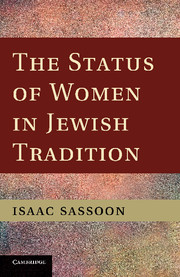Book contents
- Frontmatter
- Contents
- Preface
- Acknowledgements
- Glossary
- Abbreviations
- PART I MONOGAMY
- PART II COMMANDMENTS (MIṢVOT)
- 8 Zeman Gerama
- 9 Derekh
- 10 The Scriptural Evidence
- 11 Deuteronomy: A Pattern
- 12 The Priestly Torah
- 13 Two Writers on Purity Law
- 14 Torah Study
- PART III INTRINSIC EQUALITY
- Conclusion
- Bibliography
- Index of Authors (Medieval & Pre-modern)
- Index of Citations from Rabbinic Literature
- Index of Names (Hebrew Bible)
- Index of Names (Talmudic)
- General Index
12 - The Priestly Torah
Published online by Cambridge University Press: 01 June 2011
- Frontmatter
- Contents
- Preface
- Acknowledgements
- Glossary
- Abbreviations
- PART I MONOGAMY
- PART II COMMANDMENTS (MIṢVOT)
- 8 Zeman Gerama
- 9 Derekh
- 10 The Scriptural Evidence
- 11 Deuteronomy: A Pattern
- 12 The Priestly Torah
- 13 Two Writers on Purity Law
- 14 Torah Study
- PART III INTRINSIC EQUALITY
- Conclusion
- Bibliography
- Index of Authors (Medieval & Pre-modern)
- Index of Citations from Rabbinic Literature
- Index of Names (Hebrew Bible)
- Index of Names (Talmudic)
- General Index
Summary
Sacred Meals
The Passover we meet in Ex 12:1–20, 43–51 (attributed to P) is never called a sacrifice, nor are the participants instructed to purify themselves in preparation. Furthermore, roasting is the method of cooking the meat of this Passover victim (Ex 12:9), whereas the meat for sacrificial meals is invariably boiled (Ex 29:31; Lev 6:21, 8:31; Num 6:19; Dt 16:7; Ezek 46:20; Zech 14:21; and esp. 1Sam 2:15). Some scholars classify this Passover ritual of Exodus 12 as a quasi-sacrifice because, to name another peculiarity, it is done without an altar. Hence one cannot extrapolate from anything that is said about the eating of the Passover meal in these verses. Besides, who precisely partakes of this Passover? All family members, as would appear from the word bayit in vv. 3–4, or men only, as per vv. 11, 44, 48? The probable reason P withholds sacrificial status from the Egyptian Passover is that it predates Sinai. In P, Israel's entire sacrificial system is revealed at Sinai (Lev 7:37–38). Prior to that revelation, there were no sacrifices. Not Noah, not even the patriarchs offer any in P's histories. But even when we get to P's first post-Sinai Passover at Num 9, the gender of the participants is uncertain. Thus we leave the Passover and move on to cultic meals whose participants P identifies with perfect clarity:
1) [the grain offering] is holy of holies like the sin-offering and the guilt-offering. Every male of Aaron's descendants may eat it … (Lev 6:10–11).
[…]
- Type
- Chapter
- Information
- The Status of Women in Jewish Tradition , pp. 77 - 82Publisher: Cambridge University PressPrint publication year: 2011



